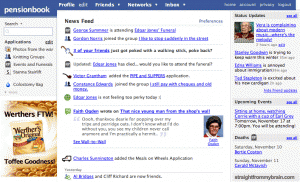 Within 39 years, so much could change, these changes could happen in ten or even five years time, but Social Networking sites would have changed dramatically by this time. Whether we like it or not, we at some point are connected to a mainframe of arbitrary networks. Whether it is a phone call, email, browsing the web or even chatting to a friend – We are connected. So with the need to stay in contact abolishing the "Recluse Era" and onto the age of technology there is an occasionally flicker of static electricity in the air as we heat up our social processors to remain internationally networking and Internet savvy!
Within 39 years, so much could change, these changes could happen in ten or even five years time, but Social Networking sites would have changed dramatically by this time. Whether we like it or not, we at some point are connected to a mainframe of arbitrary networks. Whether it is a phone call, email, browsing the web or even chatting to a friend – We are connected. So with the need to stay in contact abolishing the "Recluse Era" and onto the age of technology there is an occasionally flicker of static electricity in the air as we heat up our social processors to remain internationally networking and Internet savvy!
- Friendship Paradox - the need to have friends or be with someone who has a large friendship circle. This theory is what drives social networking sites, with people feeling the need to broaden their friendship circle. Without the Friendship Paradox we as a population would remain recluse, uninterested by Twitter updates and Facebook gossip.
- Social network sites may fall to be similar to a high street brand rather than being the Internet monopoly. More and more social network sites have arisen and are becoming popular, rather than being just one that links us "Facebook" there are niche sites that relate to us like Flixster which is movie based, LinkedIn for the business solution or even Ravelry.com for the knitting and crochet community. There is literary something for everybody nowadays so within 39 years there will be more right?
- Advertising is largely the revenue driver for the success of Social Networking and with Google predicting good things for 2015, could physical ad boards drop? Google predicted that 75% of advertisement on the web would be commented on by users (popular with Twitter and shared like Facebook). Display ads would be worth a staggering $50 billion so has this just put the price up on Facebook. However mobile phones our the worlds best kept devices with their ads being the most driven campaigns in terms of revenue. If Social networks are the way forward then mobile phones is its lifeline.

*Social network Prediction* Maps are a big part of our lives, just as phones, combined with Friendship Paradox, we could be following people around on Google maps on their phone signal.
- There is a slight concept prediction that links us between Avatar and World of Warcraft. Whilst most of us study and/or work the physical world is only a breathing apparatus whilst we stretch our computerised arms and stare into the wide abyss, which is our online world seen through our self-replicated eyes. It is the world's biggest online forum in which we run, live, create and build.
- With the population exceeding 6 billion, and with 4 billion of us equipped with a device to access Twitter, will Twitter surpass the Facebook barrier? Myspace had practically admitted defeat and decided to embrace rather than compete. And with the world being dynamic and trends varying daily, Twitter keeps on top of the trends just as quick and simple as Facebook, would Facebook Twitterise embracing a partnership like Myspace or will it fail to compete in the future, slowly diminishing like the Bebo days? Social network has to change vastly from what we know, so it could even be just as important to learn about Twitter and Facebook in our history class than in computer club.
So with that all said is there a life in 2050 for social network sites to dominate the Internet?
